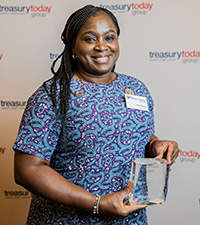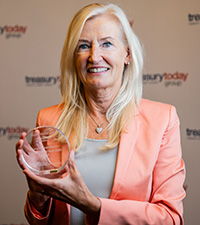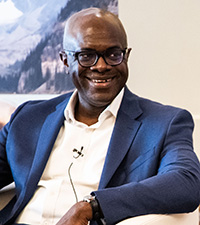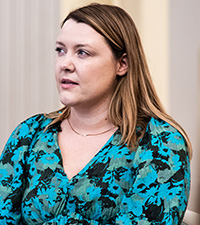Treasury Today Group’s Women in Treasury EMEA Forum took place in London’s Plaisterers’ Hall on 14th September. Sophie Jackson, Treasury Today Group’s Publisher & Head of Strategic Content hosted a panel discussion and celebratory lunch where treasury leaders from across the region discussed equity, leadership and their own career paths.
Four expert panellists joined us:
-
Kemi Bolarin – Head of Treasury – Europe, GXO Logistics
-
Brigitta Kocherhans – Head of Treasury, Siemens Healthineers AG
-
Adesola Orimalade – C-Suite Level Treasury Professional, Writer, Business Consultant, Public Speaker
-
Karen Wall – Vice President, Head of Open Banking & Value-Added Services Product Management, Europe, Middle East and Africa (EMEA), J.P. Morgan

Meg Coates, Publisher & Head of Operations at the Treasury Today Group, opened the forum at London’s beautiful Plaisterers’ Hall – complete with corniced ceilings, gold chandeliers and floor length windows – with a warm welcome to EMEA’s vibrant treasury community, remarking how the initiative has come a long way since its launch 11 years ago. Recent milestones include co-hosting an event with Microsoft CFO Amy Hood at their Seattle HQ, participating in the unveiling of Fearless Girl at her permanent home outside the New York Stock Exchange and being included within the Global Diversity List’s Top Womens’ Network in The Guardian. Most recently Treasury Today Group has just published the 2023 Women in Treasury Global Equity Study, supported by Standard Chartered.
The panel session began with Kemi Bolarin, Head of Treasury Europe at GXO Logistics, sharing her career history. Like many treasurers, she entered the profession as a chartered accountant, and landed her first role in treasury as a treasury assistant. Her manager encouraged her to take treasury exams, but she said her career journey would have been easier if she’d met more female role models or others with her Nigerian ancestry in those early days. “I am passionate about treasury because I can see the immediate consequences of my work, it puts me at the nerve centre of an organisation and it’s also a collaborative profession,” she told the 140-person audience.
Most people have a catalytic point in their career when it speeds up or goes in a new and exciting direction. For fellow panellist Brigitta Kocherhans, Head of Treasury at Siemens Healthineers that juncture came when she took on an assignment in the US, opening the door on managing a large, diverse team for the first time. “I learnt that diversity is more than gender, and that everyone is an individual; everyone is different.” In those years she also honed her positive and energetic mindset that continues to power her forward today. “The glass is always half full, never half empty. And if you fall, you stand up and you run again.”
Brigitta, who now lives and works in the German city Erlangen, remains connected to her US team and still prizes the lessons she learnt from them early on in her career. “No one told me this and I had to learn it for myself, but if you give back your team will also give back to you. When you believe and trust in people, you get everything back.”

A university degree in addiction to a banking career in fintech and payments is a winding career path. But Karen Wall, Vice President, Head of Open Banking & Value-Added Services Product Management, Europe, Middle East and Africa (EMEA) from J.P. Morgan explained that experiences drawn from her first career in addiction helped shape her approach to roles at Revolut and Western Union and continue to inform how she thinks and acts at J.P. Morgan. “The addiction space taught me about the importance of different approaches, and that everyone is different,” she said. She also shared the importance of working as a team for career progression and said that leadership involves making space for people to grow their own career. “People should be able to grow past you – they may be your boss one day.”
Karen also voiced the importance of purpose in the workplace. For her this comes via the connection between her role and creating financial inclusion and better access to money. “It’s important for corporates and people to be able to move their hard-earned money with speed and ease,” she says. “Once you understand the broad ecosystem treasury and finance fits within it is possible to see how it affects everyone. People don’t just want a career; it’s not just about the paycheque, they want a sense of purpose.”
Karen has also found purpose in the diversity movement. In a side project at J.P. Morgan, she has helped encourage women into writing code. “The tech space doesn’t have a good track record in being gender diverse. I thought I had a part to play.” In a hands-on approach that has involved “pushing” and “not choosing the path of least resistance” she has helped build coding skills amongst women in a highly rewarding process.
Adesola Orimalade, C-Suite Level Treasury Professional, Writer, Business Consultant and Public Speaker, is a male ally of women in treasury and he explained how he was also motivated by purpose early on in his career. He started out with a vision of working in housing regeneration, and then moved into banking roles at Citi and ABN Amro, amongst others. Corporate treasury roles at Hogg Robinson and Kiwi.com followed. “Wanting to put my energy into making a difference was a lightbulb moment,” he explained to the audience. Encouraging diversity in an industry he notes “few treasurers look or sound like me” and helping people realise treasury is more than “spreadsheets and numbers” has become a driving passion.
Working for a large company like Siemens brings plenty of opportunities to try new things. But it also requires a healthy dose of courage to take on new challenges. Brigitta’s courage took her all the way to CFO – where the same courage led her to reflect that her real passion was back in treasury. She stepped back into treasury and now runs a 120 team of diverse talent at carve out Siemens Healthineers where her enthusiasm for the future is infectious. She is currently recruiting data scientists into the treasury team where her priorities include promoting treasury to the wider business and providing a role model to the next generation.
Giving Back

Kemi also shares a passion to give back. “Coming from my type of family I don’t have a choice but to give back. Purpose is in my DNA,” she laughs, describing her grandmother’s eyes boring into her, driving her to help enrich her community, stay visible and give back. For her, giving back includes her role as Dean of Career Nuggets Academy, a social enterprise focused on mentoring and teaching social skills in the workplace. Skills like conflict resolution and communication are often overlooked in favour of technical skills, she said. The Academy already has 200 graduates, and another 100 people are currently in the pipeline. Kemi is also a member of mentoring network Inspiring the Future where she supports young people thinking about working in treasury and finance. “Inspiring the future and addressing the pipeline is important.”
Leadership
Leadership brings issues for which it is difficult to prepare. Despite learning from managers and training programmes, leadership requires a different side of ourselves including recognising diversity and finding pleasure in bringing people together. It also involves encouraging people to share, said Adesola who says people are inherently reluctant to share their stories because they fear judgement. “People are afraid of being called out. Leadership requires creating an environment where we feel safe.”
The conversation also turned to the difference between equity and equality. Equality, agreed the panellists, is best described as treating people equally. However, it can perpetuate inequality as everyone has different backgrounds and circumstances. Equity on the other hand recognises that people are different individuals. “Equity is about understanding the human in front of me, who is the person in my team and how can I encourage them to flourish,” said Kemi.

DEI initiatives can flounder, despite good corporate intentions. One way to keep initiatives progressing and impactful is to set up monitoring groups and ensure someone in the leadership team has a direct link to progress via KPIs. Moving the needle on DEI requires an organisational shift from the top, said Adesola. “Accept that is going to be a long hard slog. Entrenched interests are always an issue. With senior support you can do a lot.”
Panellists reflected that as individuals it is hard to make change, but as a group, and connecting with other groups, it is easier. Meanwhile policies provide an important framework, for example HR policies can also drive change.
Karen counselled on the importance of DEI leaders understanding what it is possible to control – and understanding the difference between change over the long and short term. She agreed that cultural change is best achieved by working with a wider team and urged treasury teams to look at how they are supporting emerging talent, and talent wanting to rejoin. “Look within your own team first,” she said. “Are you practicing what you are preaching?”
The conversation concluded with reflections on career growth beyond treasury. It is possible to apply treasury skills anywhere in a business and promotion often involves seeking out other areas to drive growth and shape policy. Career progression also involves embracing technology and nurturing the right skills to bring to any future role.

